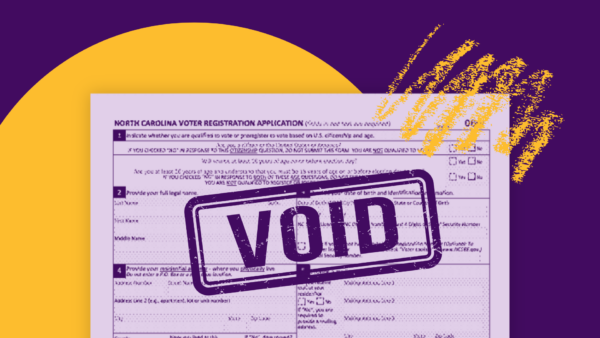DURHAM, N.C. (Oct. 24, 2024) — The North Carolina State Conference of the NAACP and two voters are urging the U.S. Court of Appeals for the Fourth Circuit to stop a dangerous attempt to purge a quarter of a million registered voters from North Carolina’s voter lists just weeks before the November election.
Southern Coalition for Social Justice (SCSJ), the Lawyers’ Committee for Civil Rights Under Law, and Mayer Brown filed an amicus brief in Republican National Committee v. North Carolina State Board of Elections on behalf of the NC NAACP, as well as Sailor Jones and Bertha Leverette, two voters targeted by the Republican National Committee and North Carolina GOP’s requested purge.
The brief details how the National Voter Registration Act of 1993 (NVRA) forbids all of the Republican National Committee’s requested relief and requires the complete dismissal of the lawsuit. Importantly, the NVRA prohibits systematic voter purges anytime in the 90 days before a federal election.
“There is a good reason for preventing systematic removal programs within 90 days of a federal election,” the amicus states, as that is when “the risk of disfranchising eligible voters is the greatest.”
Read the full amicus brief here.
The NC NAACP, along with Jones and Leverette, filed the brief in order to ensure that North Carolina voters receive the full range of federal voting rights protections as Congress intended, and so that the individuals targeted by this purge attempt are not disenfranchised — who, based on public data, are disproportionately Black voters.
“The Fourth Circuit needs to block the RNC and NC GOP’s attempt to suppress votes in North Carolina,” said Deborah Dicks Maxwell, President of the NC NAACP. “This lawsuit is a calculated effort to quickly purge our voter list, hiding behind false claims about illegal ballots to push an anti-immigrant, racist agenda. We won’t let this attack on the rights of Black and Brown voters go unanswered.”
“While North Carolinians are turning out in record numbers to vote early, the RNC and NC GOP are focused on undermining our freedoms,” said Sailor Jones, one of the individual voters and Associate Director of Common Cause North Carolina. “The Fourth Circuit must stop this dangerous conspiracy theory that could silence the voices of 250,000 voters who did nothing wrong.”
“The NC GOP waited months to attempt this purge, waiting until we were in the heat of the election to create as much fear and confusion as possible,” said Bertha Leverette, one of the individual voters. “Without a single piece of evidence that myself or any of the other voters on their hit list are actually ineligible to vote, the plaintiffs are trying to cut us out of our nation’s election. The Court cannot let this happen.”
“This case ignores the work of the State Board to verify these voter registrations, the robust protections of federal law, and the simple fact that any supposed missing voter information is due to administrative changes that are completely out of the control of the impacted voters,” said Jeff Loperfido, Chief Counsel for Voting Rights at SCSJ. “The plaintiffs haven’t shown, or even tried to show, that a single voter is actually ineligible. Pushing this baseless case fuels the fire for those determined to dispute valid election results they don’t like.”
”Nearly a quarter of 1 million North Carolinians’ votes hang in the balance. Federal laws like the NVRA are designed to prevent what is at the heart of this case–late-stage attempts to prevent voters from participating in the political process,” said Jennifer Nwachukwu, Senior Counsel with the Voting Rights Project at the Lawyers’ Committee for Civil Rights Under Law.
Individuals in North Carolina who have any questions or issues while voting can call the NC Election Protection Hotline at (888) OUR-VOTE to get voting help from a trained volunteer. Individuals outside of North Carolina can call the national Election Protection Hotline at (866) OUR-VOTE.
XXX
Southern Coalition for Social Justice, founded in 2007, partners with communities of color and economically disadvantaged communities in the South to defend and advance their political, social, and economic rights through the combination of legal advocacy, research, organizing, and communications. Learn more at southerncoalition.org and follow our work on Twitter, Facebook, and Instagram.
The Lawyers’ Committee for Civil Rights Under Law is a nonpartisan, nonprofit organization, formed in 1963 at the request of President John F. Kennedy to mobilize the nation’s leading lawyers as agents for change in the Civil Rights Movement. Today, the Lawyers’ Committee uses legal advocacy to achieve racial justice, fighting inside and outside the courts to ensure that Black people and other people of color have the voice, opportunity, and power to make the promises of our democracy real. The Lawyers’ Committee implements its mission and objectives by marshaling the pro bono resources of the bar for litigation, public policy, advocacy and other forms of service by lawyers to the cause of civil rights.
As the first major law firm to develop and implement a pro bono strategic plan, Mayer Brown has long deployed its considerable resources to offer access to the justice system and confront systemic problems around the world where it can have a major impact. To that end, in 2020 the firm launched Project Equity to combat systemic racism and promote racial equity. Visit: https://www.mayerbrown.com.
The NAACP advocates, agitates, and litigates for the civil rights due to Black America. Our legacy is built on the foundation of grassroots activism by the biggest civil rights pioneers of the 20th century and is sustained by 21st century activists. From classrooms and courtrooms to city halls and Congress, our network of members across the country works to secure the social and political power that will end race-based discrimination. That work is rooted in racial equity, civic engagement, and supportive policies and institutions for all marginalized people. We are committed to a world without racism where Black people enjoy equitable opportunities in thriving communities.

